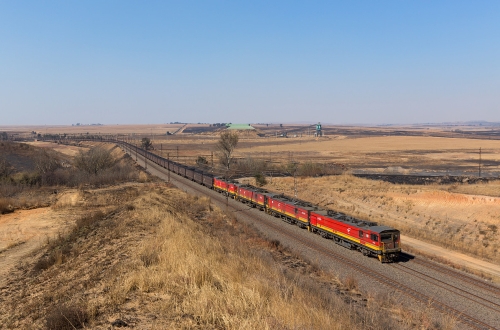Operating costs rose by 6.5% to Rand 40.4bn, including an average 13.6% increase in energy costs, while Transnet also achieved savings against planned costs totalling Rand 3.1bn. Ebitda increased 18% to Rand 32.5bn while net profit improved by 75% from Rand 2.8bn to Rand 4.9bn. Total cash generated from Transnet’s overall operations grew 12.6% from Rand 31bn to Rand 34.9bn.
Transnet Freight Rail increased revenue by 11.7% to Rand 43.7bn and transported a record 77 million tonnes of coal, a 4.3% increase including a monthly record of 7.2 million tonnes in September 2017. Wagon cycle-time also improved to 62.6 hours, down from 63.7 hours the previous year.
Despite disruptions caused by adverse weather conditions, Transnet achieved a 2.3% increase in export iron-ore volumes to 58.5 million tonnes, although accidents, particularly mainline derailments, resulted in volume losses.
Transnet says it has largely achieved the objectives of its Market Demand Strategy (MDS), which included some of the country’s largest capital projects, and is switching to the new Transnet 4.0 strategy, which involves the investment of a further Rand 163.7bn over five years to take the company to “new heights of digitisation and innovation.
The investments completed during the past year under MDS include:
- Rand 2.3bn in rail infrastructure
- Rand 212m in expanding capacity for manganese beyond 5.5 million tonnes
- Rand 55m to upgrade yards, lines and electrical equipment
- Rand 2.8 billion expanding capacity on the export coal line to 81 million tonnes per annum, and
- Rand 98m in the Waterberg upgrade stage 2 which aims to increase capacity to 6.3 million tonnes per annum.
Transnet’s investments include the purchase of 1064 locomotives to modernise its fleet in anticipation of a rise in general freight volumes and solidifying its ‘road to rail’ strategy. A total of 402 locomotives have entered service while 16 have been delivered and are currently undergoing testing.
During the year, Transnet Freight Rail and Transnet Engineering built:
- 2500 coal containers to service Eskom power stations
- 300 CR-13/14 wagons for the iron-ore business
- 86 SCL wagons for the automotive business, and
- 364 CR wagons to be used within the mining sector.

